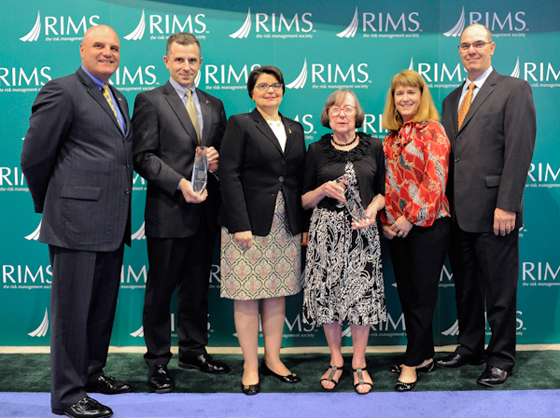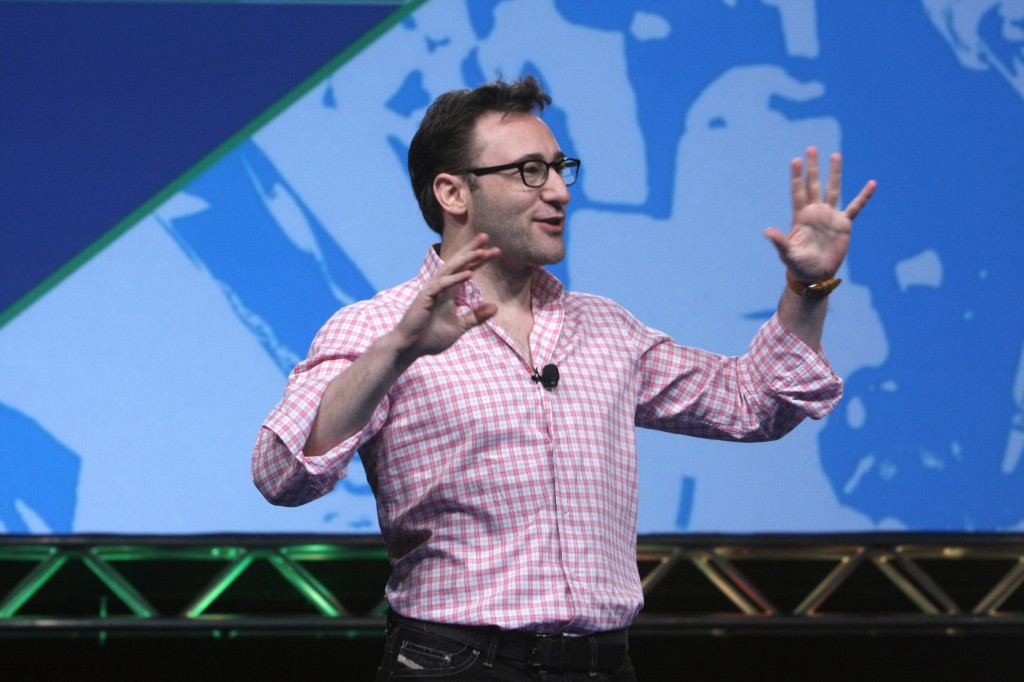Robert Nighan (second from left) accepted the honor for Hall of Fame inductee David Sterling while the late Robert Spencer’s honor was accepted by his wife Charlotte (third from right) and daughter Libby (second from right). (Photo: Joe Zwielich)
David C. Sterling and Robert S. Spencer are the newest members of the Risk Management Hall of Fame, RIMS and AIG announced today. The Risk Management Hall of Fame serves as a means to maintain the history of the field of risk management and recognizes risk practitioners who have made significant contributions to advancing the discipline. Both honorees were officially inducted at RIMS 2013 Annual Conference & Exhibition in Los Angeles.
In order to be selected, the Risk Management Hall of Fame considers the following criteria: considerable contributions to the field; significant achievements, innovation and trend setting; demonstrated leadership, character and service; and the highest caliber of ethical and professional conduct.
So with this in mind, here are some of the accomplishments of the 2013 inductees:
DAVID C. STERLING
 David C. Sterling joined The Hartford Financial Services Group, Inc. in 1964 after serving two years with the U.S. Army at Fort Kobbe, Panama Canal Zone. He retired from The Hartford after 42 years as assistant vice president and senior risk manager, where he managed The Hartford’s worldwide risk programs and exposures to accidental loss including the placement of all insurance and non-insurance programs designed to protect the organization.
David C. Sterling joined The Hartford Financial Services Group, Inc. in 1964 after serving two years with the U.S. Army at Fort Kobbe, Panama Canal Zone. He retired from The Hartford after 42 years as assistant vice president and senior risk manager, where he managed The Hartford’s worldwide risk programs and exposures to accidental loss including the placement of all insurance and non-insurance programs designed to protect the organization.
David is a risk and insurance pioneer. He purchased and implemented one of the first EPLI (employment practices liability insurance) programs in the insurance industry; purchased and implemented one of the first cyber risk liability, property and crime insurance programs; and implemented one of the industry’s first blended multi-year program for a financial institution and rolled the program over several times to achieve significant savings.
Throughout his career, he shared his professional experiences and expertise with students and risk professionals who expressed interest in advancing their careers.
At the West Hartford Branch of the University of Connecticut, he taught the Insurance Institute of America’s Risk Assessment program, one of three courses required for The Institute’s Associate in Risk Management (ARM) designation.
Additionally, he was a reviewer of The American Institute for CPCU (now called “The Institutes”) texts for the Chartered Property Casualty Underwriter (CPCU) designation program which focuses on risk management and insurance, as well as a reviewer of other texts published by them. For more than 30 years, he served The Institutes on its CPCU Exam Review Committee. He also authored a CPCU monograph entitled “Environmental Liability: An Insurance Perspective.”
David is currently a member of RIMS Connecticut Valley Chapter, the CPCU Society and the Society of CIC. He holds 28 professional risk management and insurance designations, as well as a State of Connecticut’s producer’s license and a State of Connecticut’s certified insurance consultant license.
ROBERT SPENCER
 During his 17-year career, Robert S. Spencer held numerous risk management positions including vice president of insurance for Fuqua Industries Inc.
During his 17-year career, Robert S. Spencer held numerous risk management positions including vice president of insurance for Fuqua Industries Inc.
At Fuqua, he was responsible for the development and implementation of the organization’s risk management program that included a very diverse portfolio that includes everything from the manufacturing of lawnmowers and sporting good to being the eighth-largest trucking company in the United States. In 1976, he co-founded Fuqua’s Bermuda-based captive, Fuqua Insurance Company Ltd.
Robert is credited with setting standards on the dealings of captives with reinsurance markets, both domestic and international. He was also responsible for a workers compensation self-retention program that was adopted by 31 U.S. states in the Fuqua program.
Robert served the Atlanta Chapter of RIMS in all officer positions including president in 1973. He also served as a vice president of RIMS from 1974 – 1977 and RIMS president from 1977 – 1978. He was a founding member of the Canadian Institute of Chartered Accountants.
Most importantly, Robert was quick to share the knowledge he gained with others so that the principles of “good” risk management could be passed on without reinvention. He fostered numerous programs at both the Atlanta Chapter and international levels of RIMS to support students, and expose them to the risk management profession.
Thirty-four years after his death in 1979, his legacy continues to provide educational opportunities for young men and women seeking to advance their education in business, insurance, actuarial sciences, and the risk management fields through the Spencer Educational Foundation. Established in 1979 in his memory, the Foundation funds the education of tomorrow’s risk management and insurance industry leaders. Since 1999, the charitable organization has awarded $4.7 million in student scholarships and $2.2 million in educational grants.
Additionally, Robert was responsible for establishing RIMS’ Anita Benedetti Student Involvement Program in 1978.




